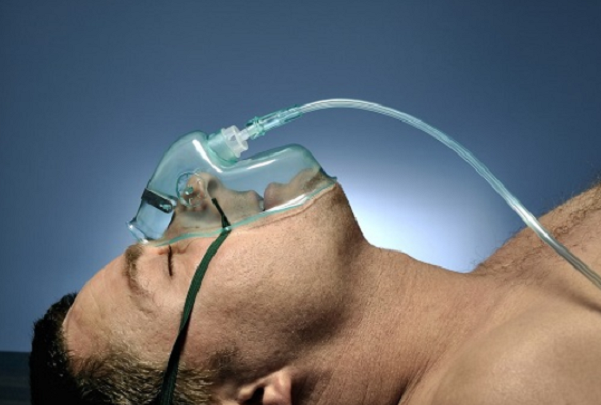Anaphylaxis before, during and after surgery
Anaphylaxis is one of the dangerous complications during and after surgery, which can even be fatal if not detected and handled promptly. In this article, some issues related to anaphylaxis during and after surgery will be mentioned to help readers easily recognize this complication.
1. What is anaphylaxis?
Anaphylaxis is defined as a serious reaction, occurring when the body has an allergic reaction to drugs, chemicals, foods, insect venoms, plastics... Usually, anaphylaxis Protection occurs very quickly within seconds – minutes after the body is exposed to the allergen.
When anaphylaxis occurs, a series of chemicals will be released by the immune system, leading to a sudden drop in blood pressure and airway obstruction. In addition, the patient will also have more severe signs such as:
Weak and fast pulse. Nausea, vomiting. Red rash on the skin. Wheezing, shortness of breath, constriction of the airways. Throat choking... Anaphylaxis needs immediate treatment. If it goes on for too long, this complication can cause loss of consciousness and even death.

Sốc phản vệ khi không được điều trị kịp thời sẽ gây tử vong
2. Learn about anaphylaxis in surgery
Common triggers for anaphylaxis in surgery are usually muscle relaxants. Besides, anesthetics and antibiotics can also cause this condition (accounting for about 10% of causes).
More specifically, some drugs that cause anaphylaxis include:
Antibiotics such as Streptomycin, ampicillin, penicillin, amoxicillin, cephalosporin... Non-steroidal anti-inflammatory drugs such as ibuprofen, salicylates, indomethacin... Some vitamins intravenously such as vitamin C, vitamin B1, vitamin B12 ... In which, intravenous vitamin C is the cause of anaphylaxis common in our country. Some fluids such as glucose, nutrisol, bestamin, tryptophan... Anesthesia: novocaine, procaine, lidocaine, thiopental... Contrast contains iodine. Some hormones like vasopressin, ACTH, insulin... Low molecular weight drugs. Some serums, vaccines, enzymes... Anaphylaxis in surgery can be difficult to diagnose because the patient may not be symptomatic. A small number of cases may have skin manifestations, but most are very difficult to recognize. Therefore, doctors need to take adequate precautions including:
A complete medical history examination of the patient. Test for allergies with several blood tests, especially for latex allergy in high-risk patients.
3. How to recognize anaphylaxis in surgery?
Nurses and doctors are forced to install blood pressure monitors - pulse as well as respiratory status of patients for surgery with general anesthesia. When blood pressure drops suddenly and breathing becomes abnormal, the patient is likely to have anaphylaxis, which requires prompt management.
4. Learn about anaphylaxis after surgery
After major surgeries, the patient will still be monitored in the hospital for a certain period of time. During this time, the infusion of some drugs can also cause anaphylaxis to the patient.
At this point, the patient is awake from the anesthesia during surgery, it will become easier to recognize anaphylaxis after surgery.
Depending on the grade, postoperative anaphylaxis can be diagnosed based on the following clinical manifestations:
These signs appear very quickly within a few minutes after infusion / ingestion of the drug that carries the allergen to the body. Therefore, doctors and nurses will easily recognize and give emergency treatment in time.
In cases where the patient has returned home after minor operations and has been prescribed some medications, post-operative anaphylaxis can also occur with a number of agents such as drugs, the most common being penicillin, followed by ibuprofen, aspirin, naproxen,...
Family members need to monitor the patient while taking the drug and recovering from surgery. When detecting a patient with the above-mentioned signs of anaphylaxis, the patient should be taken to the hospital immediately.
5. Treatment - how to overcome anaphylaxis?
Discontinue use of any agent suspected of causing an allergic reaction, protect the airways and increase oxygen circulation. Adrenaline injection/infusion with appropriate dose, close hemodynamic monitoring. Depending on the patient's response to adrenaline, the doctor will have different treatment. For anaphylaxis during surgery, doctors need to finish the surgery as quickly as possible and the post-operative work will include intensive care, as anaphylaxis can return in about 32 hours. then (rate 20%). Control the patient after anaphylaxis. It can be seen that anaphylaxis is a serious reaction that can occur when the body is allergic to agents, especially anesthetics / anesthetics / muscle relaxants... in surgery and antibiotics after surgery. Therefore, patients need to be examined before anesthesia to assess specifically the risk of drug use, to limit this complication to the maximum extent.

Bệnh nhân cần được theo dõi cẩn thận trước-trong-sau phẫu thuật để tránh sốc phản vệ
Vinmec International General Hospital is one of the hospitals that not only ensures professional quality with a team of leading medical doctors, modern equipment and technology, but also stands out for its examination and consultation services. comprehensive and professional medical consultation and treatment; civilized, polite, safe and sterile medical examination and treatment space.
Customers can directly go to Vinmec Health system nationwide to visit or contact the hotline here for support.
Articles refer to the source: NCBI, Webmd.com






